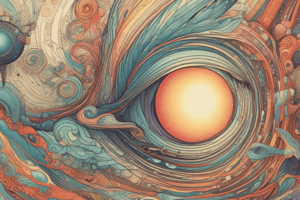Podcast
Questions and Answers
What does Extra-Sensory Perception (ESP) primarily refer to?
What does Extra-Sensory Perception (ESP) primarily refer to?
- Seeing events that are occurring in another location
- The ability to see into the future
- Gaining information without traditional senses (correct)
- Communicating through visual symbols
Which type of ESP involves mind-to-mind communication?
Which type of ESP involves mind-to-mind communication?
- Clairvoyance
- Telepathy (correct)
- Psychometry
- Precognition
What is a common reason people seek psychic readings?
What is a common reason people seek psychic readings?
- To contact deceased loved ones
- To learn about scientific phenomena
- For guidance on personal issues (correct)
- To predict stock market trends
What is a major critique the scientific community has regarding ESP?
What is a major critique the scientific community has regarding ESP?
In which century did spiritualism and the popularization of psychic phenomena primarily rise?
In which century did spiritualism and the popularization of psychic phenomena primarily rise?
Which field of study explores paranormal phenomena including ESP?
Which field of study explores paranormal phenomena including ESP?
What element of popular culture often exaggerates perceptions of ESP abilities?
What element of popular culture often exaggerates perceptions of ESP abilities?
What is a significant concern related to the psychic community?
What is a significant concern related to the psychic community?
Study Notes
Overview of ESP
- Definition: Extra-Sensory Perception (ESP) refers to the ability to gain information without the use of the traditional five senses.
- Types of ESP:
- Telepathy: Mind-to-mind communication; transferring thoughts or feelings from one person to another.
- Clairvoyance: Perception of events or objects that are distant or not present to the senses; "seeing" beyond normal vision.
- Precognition: The ability to foresee future events; knowing something will happen before it occurs.
- Psychometry: Gaining information about an object or person by touching or holding an object.
Historical Context
- Early History:
- Instances of ESP-like phenomena documented in ancient texts and folklore.
- 19th Century:
- The rise of spiritualism; popularization of psychic phenomena through mediums.
Scientific Perspective
- Skepticism: The scientific community generally views ESP with skepticism due to lack of empirical evidence and reproducibility.
- Research:
- Various studies conducted (e.g., Ganzfeld experiments) to test telepathy and other forms of ESP but results are often disputed.
Popular Culture
- Media Representation: ESP featured in films, books, and television, often creating exaggerated perceptions of abilities.
- Notable Figures:
- Psychics and mediums who claim ESP abilities, gaining popularity through testimonies and media exposure.
Applications
- Psychic Readings: Many people seek psychic services for guidance or insight into personal issues.
- Parapsychology: A field of study that explores paranormal phenomena including ESP, often regarded as controversial.
Criticism & Controversies
- Scientific Critique:
- Lack of controlled, replicable research challenges the legitimacy of ESP claims.
- Fraud Concerns: Instances of deception and scams observed in the psychic community impacting public perception.
Conclusion
- ESP remains a debated subject, straddling the line between science and the paranormal. While many claim experiences of ESP, scientific validation remains elusive.
Extra-Sensory Perception (ESP)
- ESP refers to acquiring information without the use of the five senses.
- The ability to transfer thoughts or feelings between individuals is known as telepathy.
- Clairvoyance is the perception of distant or absent events or objects, going beyond normal vision.
- The ability to foresee future events is called precognition.
- Psychometry involves gaining information about an object or person through touch.
ESP in History
- Evidence of ESP-like phenomena exists in ancient texts and folklore.
- Spiritualism gained popularity in the 19th century, promoting psychic phenomena through mediums.
Scientific Perspective on ESP
- The scientific community generally remains skeptical of ESP due to a lack of empirical evidence and reproducible results.
- Studies like Ganzfeld experiments have been conducted to test telepathy and other forms of ESP, but their results are often contested.
ESP in Popular Culture
- ESP is frequently depicted in books, films, and television, often exaggerating its abilities.
- Psychics and mediums claiming ESP abilities gain popularity through media exposure and testimonies.
ESP: Applications and Criticism
-
Psychic readings offer guidance and insight into personal issues.
-
Parapsychology is a controversial field studying paranormal phenomena, including ESP.
-
Scientific criticism highlights the lack of controlled, replicable research to support ESP claims.
-
Public perception of ESP is influenced by instances of deception and scams within the psychic community.
### Conclusion
- ESP continues to be a debated topic between science and the paranormal.
- While many report experiences of ESP, scientific validation remains elusive.
Studying That Suits You
Use AI to generate personalized quizzes and flashcards to suit your learning preferences.
Description
Explore the intriguing world of Extra-Sensory Perception (ESP). This quiz covers the definition, types, historical context, and the scientific scrutiny surrounding ESP phenomena. Test your knowledge on telepathy, clairvoyance, precognition, and more.




